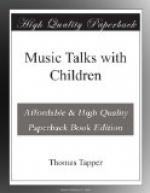Among us it is quite the same. Some are more skilful than others. But be our skill great or small, we are not truly using it until we have devoted it to a worthy purpose. And as with us, so it is with the musicians. There are the great and small. The great ones—leaders of thought—we call the great masters. The lesser are earnest men, who have not as much power as the masters, but they are faithful in small things.
They sing lesser songs it is true, but not less beautiful ones. Often these lesser ones think more as we do. They think simply and about the things which we have often in our minds. It is such thoughts as these which we have in our best moments that we love so much when we see them well expressed by one who is a good and delicate writer, either of tones or words. Particularly do we understand these thoughts well in the first years of our music when nearly all the works of the greater composers are above us.
Thus are the many composers (who yet are not great masters) of value to us because they write well a kind of thought which is pure and full of meaning, and which we can understand. They give us true pleasure day after day in the beginning and seem at the same time to help us onward to the ability of understanding the great masters. This they do by giving our thought training in the right direction.
Now, we know that the very best music for a young musician to learn in the first days is that of the lesser tone masters, together with those simpler pieces of the great composers which come within his power to comprehend—within the power of a child’s hands and voice. Let us see, once again, if it is not clear:
True composers, great and small, sing from the heart. If one having a little skill turn it unworthily away from the good and true work he might do, then he does not use rightly his one talent. He does not give us true thought in tone. He writes for vanity or a low purpose, and is not a lesser master but he is untrue.
It is not our right to play anything. We may rightly play only that which is full of such good thought as we in our power may understand. It is to supply us with just this that the lesser masters write. In simple, yet clear and beautiful pictures, they tell us many and many a secret of the world of tone into which we shall some day be welcomed by the greater ones if we are faithful unto the lesser.
CHAPTER XIV.
HARMONY AND COUNTERPOINT.
“Whilst I was in Florence, I did
my utmost to learn the exquisite
manner of Michaelangelo, and never
once lost sight of
it.”—Benvenuto
Cellini.[43]
On any important music subject Schumann has something to say. So with this:
“Learn betimes the fundamental principles of harmony.” “Do not be afraid of the words theory, thorough-bass, and the like, they will meet you as friends if you will meet them so.”




